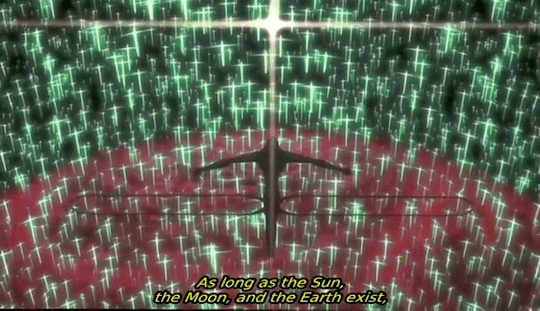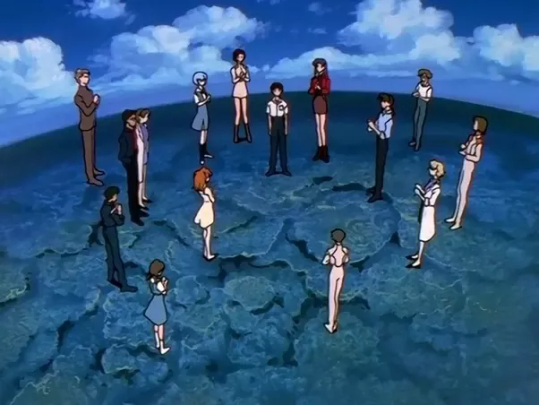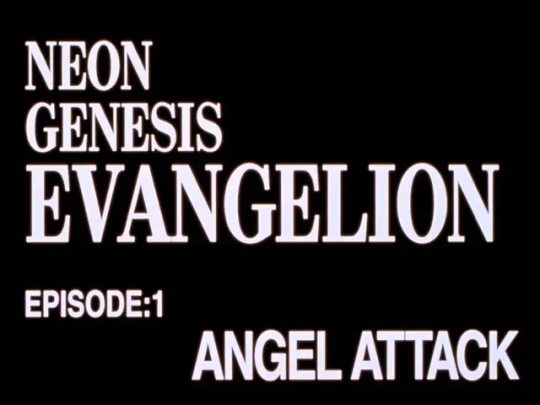"ᴛʜᴇʀᴇ ɪꜱ ɴᴏ ᴘᴀʀᴀᴅɪꜱᴇ ꜰᴏʀ ʏᴏᴜ ᴛᴏ ᴇꜱᴄᴀᴘᴇ ᴛᴏ. ɢᴏ. ɢᴏ ʙᴀᴄᴋ. ʙᴀᴄᴋ ᴛᴏ ʏᴏᴜʀ ʙᴀᴛᴛʟᴇꜰɪᴇʟᴅ."
Don't wanna be here? Send us removal request.
Text
The Hedgehog's Dilemma
The Hedgehog's Dilemma is a metaphor used in the series to illustrate the challenges of human intimacy. The term is taken from Schopenhauer's essay "Parerga and Paralipomena," where he uses it to explain the challenges of human relationships. In the context of "Neon Genesis Evangelion," the Hedgehog's Dilemma is a metaphor for the difficulty people face when trying to form close connections with others.
In the series, the main characters, particularly the pilots of the Evangelion mechs (Shinji Ikari, Rei Ayanami, and Asuka Langley Soryu), struggle with their own emotional issues and find it challenging to connect with others. The Hedgehog's Dilemma is used to convey the idea that while individuals crave social interaction and closeness, they also fear the potential pain and vulnerability that can come with opening up to others.

The metaphor is made more explicit in the series through scenes where characters are represented as hedgehogs trying to get close to each other but fearing the pain caused by their metaphorical spines. This theme is woven into the narrative, reflecting the psychological struggles and emotional isolation experienced by the characters.
"Neon Genesis Evangelion" is known for its complex narrative, rich symbolism, and psychological depth, and the Hedgehog's Dilemma is just one of the many elements contributing to the series' exploration of the human condition.

In Civilization and its Discontents, Sigmund Freud notes three inevitable sources of human suffering. First, our finite biological body that is fated to decay. Second, the cruel and inhabitable natural world albeit beautiful. And finally, our relations with others which, Freud observes, causes us the most pain even if it may seem silly. It is the last source of human suffering that is at stake in Evangelion. In his essay on Mass Psychology, Freud cites the famous hedgehog's dilemma from philosopher Arthur Schopenhauer.
Schopenhauer's fable tells us that the proximity with the other is almost unbearable for most people. For humans, like hedgehogs, are enveloped with spikes. Humans are thereby prevented from attaining absolute intimacy. We are led to conclude that there is a gap between the self and the other. All we can do is helplessly cling unto one another for the sake of attaining warmth-a warmth that would presumably thaw the frost of loneliness to fill the void in our hearts. The Freudian question, however, is to ask what is it that drives us to desire absolute intimacy in the first place?

1 note
·
View note
Text
Humanity's Perfection Project
The Human Instrumentality Project is a global-scale event initiated by the organization NERV, with the ultimate goal of uniting all of humanity into a single, collective consciousness. The series explores complex themes such as existentialism, human psychology, and the nature of consciousness. The Human Instrumentality Project (HIP) is a central plot element that plays a crucial role in the later episodes of the series and the accompanying movie, "The End of Evangelion."
The project is closely tied to the existence of mysterious beings called Angels and the use of giant bio-mechanical entities called Evangelions to combat them. The story delves into the psychological struggles of the main characters, particularly the protagonist, Shinji Ikari, as they confront their fears, insecurities, and the impact of the Human Instrumentality Project on the world.

The specifics of the Human Instrumentality Project and its outcome are complex and open to interpretation, contributing to the series' reputation for its philosophical and psychological depth. The concept has become iconic in the realm of anime and is often discussed in the context of the series' exploration of the human psyche and the nature of existence.

The English ʻHuman Instrumentality Projectʼ itself is actually a red herring or a misnomer. The original in Japanese is called 人類補完計画 Jinrui Hokan,Keikaku. The first and last terms are self-explanatory. 人 類 Jinrui, for example, refers to mankind or humanity while 計画 Keikaku means a plan or project. The problem then arises with the middle term 補完 Hokan which is usually translated as ʻinstrumentalityʼ in English. The Kanji 補完 Hokan is a combination of two characters. On the one hand, the character 補 Ho means to supply or compensate.
In Chinese, it means to repair something thatʼs broken. On the other hand, 完 Kan simply means finish; end or complete. A combination of the two will thus create 補完 Hokan which can be nicely translated as completion; complementation or perfection. Hence, 人類補完計画 Jinrui Hokan Keikaku roughly translates to ʻHumanityʼs Completion/Complementation/Perfection Project'. Therefore, what is the inherent failure, lack and imperfection within humans that SEELE desperately wants to overcome?

0 notes
Text
Intro To the Philosophy of Neon Genesis Evangelion
"Evangelion", says Hideaki Anno is like a jigsaw puzzle, where the customer is presented with pieces of the puzzle. The assembling of the pieces is left to the audience. But there are no pictures of the finished product, so everyone imagines a different picture of the finished one. If there are parts you can't find, I just tell you to fill in the missing parts by yourself. The process of assembling a jigsaw is fun, but the process of imagining the finished one is more fun. The word 'provocative' best describes Evangelion. Provocative not in the bad but good sense. Its Latin derivation provocare, for instance, precisely means 'to call forth, challenge.'
Set in a post-apocalyptic world, the story revolves around a group of teenagers recruited by the organization NERV to pilot giant bio-mechanical robots known as Evangelions. These robots are humanity's last line of defense against mysterious beings called Angels, which threaten to bring about the end of the world.

The main protagonist is Shinji Ikari, a reluctant and emotionally troubled teenager who is thrust into the role of an Evangelion pilot. As the series progresses, it becomes clear that each pilot has their own psychological struggles and traumas. The plot delves into complex themes such as existentialism, the nature of consciousness, and the impact of trauma on individuals.
As the conflict with the Angels escalates, the series takes unexpected turns, exploring the mysterious origins of the Evangelions, the true nature of the Angels, and the secretive organization known as SEELE. The narrative becomes increasingly surreal and introspective, blurring the lines between reality and psychological landscapes.
Later on, the Human Instrumentality Project is introduced, which has the goal to initiate a process that would merge all of humanity into a single, collective consciousness, effectively eliminating individuality and the barriers between people. The project directly targets a philosophical theme called "The Hedgehog's Dilemma" which implies that the closer we get to others the more we hurt them. This series has many philosophical themes, many of which are from Søren Kierkegaard's book "The Sickness Unto Death."

7 notes
·
View notes